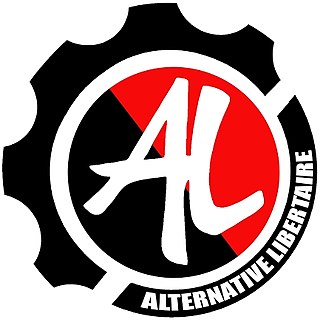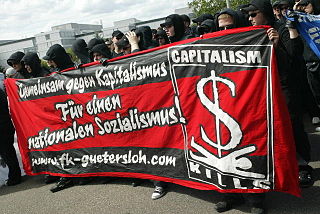Anarchism is a political philosophy and movement that is skeptical of all justifications for authority and seeks to abolish the institutions it claims maintain unnecessary coercion and hierarchy, typically including nation-states, and capitalism. Anarchism advocates for the replacement of the state with stateless societies and voluntary free associations. As a historically left-wing movement, this reading of anarchism is placed on the farthest left of the political spectrum, usually described as the libertarian wing of the socialist movement.
Anarchist communism is a political philosophy and anarchist school of thought that advocates communism. It calls for the abolition of private property but retention of personal property and collectively-owned items, goods, and services. It supports social ownership of property and the distribution of resources "From each according to his ability, to each according to his needs".
The history of anarchism is ambiguous, primarily due to the ambiguity of anarchism itself. Scholars find it hard to define or agree on what anarchism means, which makes outlining its history difficult. There is a range of views on anarchism and its history. Some feel anarchism is a distinct, well-defined 19th and 20th century movement while others identify anarchist traits long before first civilisations existed.

The Zabalaza Anarchist Communist Front, formerly known as the Zabalaza Anarchist Communist Federation (ZabFed), is a platformist–especifista anarchist political organisation in South Africa, based primarily in Johannesburg. The word zabalaza means "struggle" or "active rebellion" in isiZulu, isiXhosa, siSwati and isiNdebele. Initially, as ZabFed, it was a federation of pre-existing collectives, mainly in Soweto and Johannesburg. It is now a unitary organisation based on individual applications for membership, describing itself as a "federation of individuals". Historically the majority of members have been people of colour. Initially the ZACF had sections in both South Africa and Swaziland. The two sections were split in 2007, but the Swazi group faltered in 2008. Currently the ZACF also recruits in Zimbabwe. Members have experienced oppression in South Africa and Swaziland.

Alternative libertaire was a French anarchist organization formed in 1991 which publishes a monthly magazine, actively participates in a variety of social movements, and is a participant in the Anarkismo.net project. In 2019 the organization merged into the Union Communiste Libertaire

The Communist Party of Germany is an anti-revisionist Marxist-Leninist communist party in Germany. It is one of several parties which claim the KPD name and/or legacy. It was founded in Berlin in 1990. The party is also commonly referred to by the name KPD-Ost to differentiate it from other parties with the same name, most prominently the historical Communist Party of Germany.
A political international is a transnational organization of political parties having similar ideology or political orientation. The international works together on points of agreement to co-ordinate activity.
The following outline is provided as an overview of and topical guide to anarchism:
Contemporary anarchism within the history of anarchism is the period of the anarchist movement continuing from the end of World War II and into the present. Since the last third of the 20th century, anarchists have been involved in anti-globalisation, peace, squatter and student protest movements. Anarchists have participated in armed revolutions such as in those that created the Makhnovshchina and Revolutionary Catalonia, and anarchist political organizations such as the International Workers' Association and the Industrial Workers of the World have existed since the 20th century. Within contemporary anarchism, the anti-capitalism of classical anarchism has remained prominent.

Queer anarchism, or anarcha-queer, is an anarchist school of thought that advocates anarchism and social revolution as a means of queer liberation and abolition of hierarchies such as homophobia, lesbophobia, transmisogyny, biphobia, transphobia, aphobia, heteronormativity, patriarchy, and the gender binary. People who campaigned for LGBT rights both outside and inside the anarchist and LGBT movements include John Henry Mackay, Lucía Sánchez Saornil, Adolf Brand and Daniel Guérin. Individualist anarchist Adolf Brand published Der Eigene from 1896 to 1932 in Berlin, the first sustained journal dedicated to gay issues.

Autonome Nationalisten are German, British, Dutch, and to a lesser degree Flemish, nationalists, who have adopted some of the far-left and antifa's organizational concepts, demonstration tactics, symbolism, and elements of clothing, including Che Guevara T-shirts and keffiyehs. Similar groups have also appeared in some central and eastern European countries, beginning with Poland, the Czech Republic, Ukraine, Romania and Greece and others.
German individualist philosopher Max Stirner became an important early influence in anarchism. Afterwards Johann Most became an important anarchist propagandist in both Germany and in the United States. In the late 19th century and early 20th century there appeared individualist anarchists influenced by Stirner such as John Henry Mackay, Adolf Brand and Anselm Ruest and Mynona.

The Democratic Bloc was an association of political parties and organizations in the German Democratic Republic.
Synthesis anarchism, also known as united anarchism, is an organisational principle that seeks unity in diversity, aiming to bring together anarchists of different tendencies into a single federation. Developed mainly by the Russian anarchist Volin and the French anarchist Sébastien Faure, synthesis anarchism was designed to appeal to communists, syndicalists and individualists alike. According to synthesis anarchism, an anarchist federation ought to be heterogeneous and relatively loosely-organised, in order to preserve the individual autonomy of its members.
Platformism is an anarchist organizational theory that aims to create a tightly-coordinated anarchist federation. Its main features include a common tactical line, a unified political policy and a commitment to collective responsibility.
Anarchism in Denmark emerged in the late 19th century from the revolutionary factions of early social democratic spheres, crystalizing into a widespread anarcho-syndicalist movement that reached its height during the late 1910s. After the disintegration of organized syndicalism, anarchists in post-war Denmark began to organize the squatters' movement, which led to the creation of Freetown Christiania.

Anne Lequy is a Professor for Specialized Communication – French at the Magdeburg-Stendal University of Applied Sciences and was Rector of this institution from 2014 to 2022.

The December 2021 Christian Democratic Union leadership election was held in December 2021. The leader of the party was elected indirectly by a party convention, for the first time the CDU held a vote by the membership to decide the candidate which the party's executive board proposed to the party convention. Though the convention is not obliged to elect the proposed candidates, the membership vote is considered politically binding. The online vote of members was from 4 December to 16 December 2021 and the convention in Hanover on 21 and 22 January 2022 formalised the election.
Anarchism in Taiwan first developed out of the anti-imperialist resistance to the Empire of Japan, when a number of young Taiwanese nationalists were exposed to anarchism during their studies abroad. Influenced by the anarchist movements in China and Japan, and in close cooperation with a number of Korean anarchists, the Taiwanese anarchist movement reached its height during the 1920s, before being suppressed by 1931.

Michael Koth is a German National Bolshevik, supporter of North Korea and the Juche ideology, as well as advocate for the Querfront political strategy.









